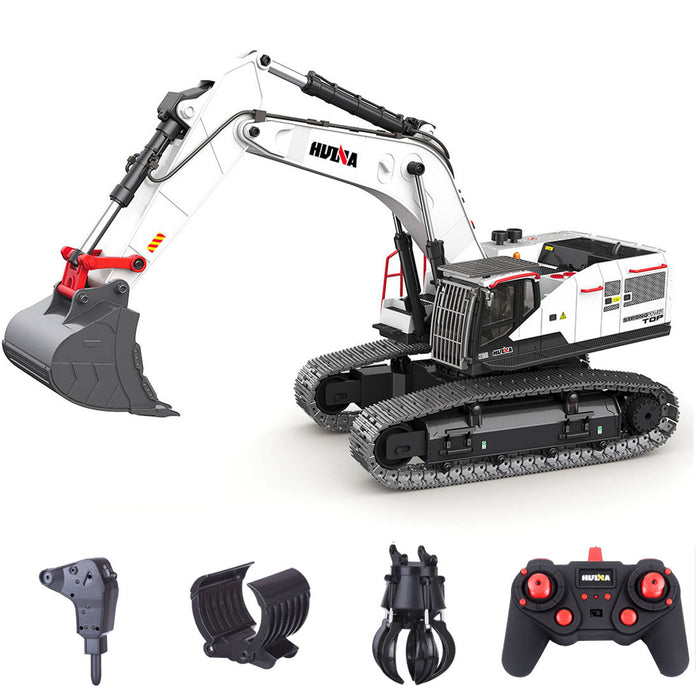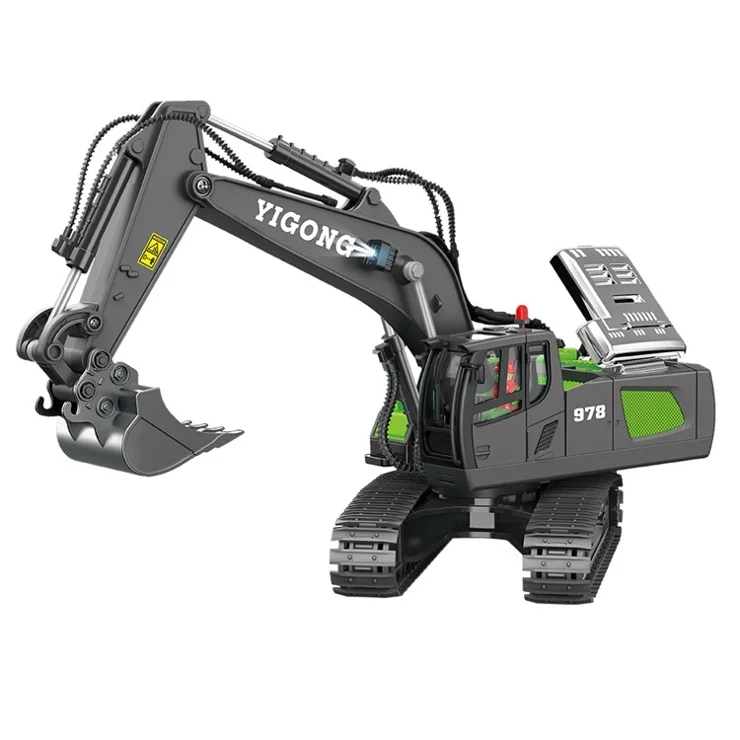Understanding How Excavator Functions and Its Influence On Effectiveness
Excavators play a crucial duty in building and mining procedures, relying upon an intricate interaction of mechanical and hydraulic systems. Their ability to do a selection of jobs rests on both their style and the technology incorporated within. Understanding these parts can considerably influence functional effectiveness and productivity. As advancements remain to improve the market, one should take into consideration just how these adjustments will certainly influence future techniques and efficiency.
The Fundamentals of Excavator Mechanics

The Role of Hydraulic Solutions in Excavators
At the heart of excavator procedure lies the hydraulic system, which plays an essential duty in powering the device's features and activities. This system utilizes pressurized hydraulic liquid to move energy, making it possible for various activities such as swinging, excavating, and training. By utilizing the principles of hydraulics, excavators can execute tasks with exceptional accuracy and pressure, boosting overall operational efficiency.The hydraulic system consists of vital parts, consisting of cylinders, pumps, and valves, which interact to control the flow and instructions of the liquid. When the operator engages the controls, the hydraulic fluid is directed to particular cylinders, translating the operator's commands into physical motion. This mechanism permits for smooth and receptive activities, which are crucial in building and excavation atmospheres. double e volvo rc excavator. The efficiency of the hydraulic system straight influences the efficiency and versatility of the excavator, making it an indispensable element in modern excavation processes
Secret Elements of an Excavator
Recognizing the vital parts of an excavator is necessary for grasping how this powerful equipment runs. An excavator contains numerous substantial components, including the undercarriage, home, pail, arm, and boom. The undercarriage provides security and movement, typically including tracks or wheels to navigate different terrains. The home includes the engine and hydraulic systems, enabling the operator to control activity and power the maker. The boom extends from your home, making it possible for vertical reach, while the arm connects to the bucket, promoting digging and training operations.Additionally, the taxicab houses the operator, outfitted with controls for precise handling. Each of these parts plays an important function in the excavator's general capability, adding to its effectiveness and performance on building sites. Recognizing these parts helps in enhancing and preserving excavator efficiency, ensuring jobs are finished securely and efficiently.
Accessory Flexibility and Its Advantages
Accessory convenience is an important facet of excavators, allowing operators to switch over in between different devices customized for certain jobs. This versatility not only improves task efficiency but additionally contributes to cost-effectiveness by reducing the requirement for multiple makers. Understanding the different types of add-ons offered can substantially affect the general efficiency and performance of an excavator on task sites.
Kinds of Add-ons
While excavators are largely recognized for their digging capacities, their real versatility depends on the wide selection of accessories offered. These attachments enhance the excavator's performance, permitting it to perform numerous jobs beyond excavation. Typical attachments consist of containers (for excavating and scooping), hydraulic thumbs (for grasping materials), and augers (for piercing holes) Grapples are utilized for moving and taking care of particles, while rippers can separate hard surface areas. Various other specialized attachments, such as trenchers and plows, allow excavators to adjust to certain job requirements. This diversity not just raises the device's utility across different sectors, consisting of building and construction, landscaping, and demolition, but additionally permits operators to tailor their equipment to fulfill particular task needs successfully.
Raised Work Performance
Making the most of work efficiency is a primary benefit of utilizing different excavator attachments. Different attachments permit an excavator to do several tasks without requiring to change devices, conserving valuable time and labor. For circumstances, utilizing a hydraulic hammer can damage concrete while a bucket add-on can excavate soil, making it possible for a smooth operations. This flexibility reduces downtime connected with devices modifications and boosts performance on-site. Furthermore, specialized add-ons improve accuracy in jobs such as grading or landscaping, resulting in better end results. The capability to adjust to numerous task demands not just simplifies operations but additionally lessens the requirement for added equipment, making certain that tasks are finished promptly and efficiently. On the whole, attachment versatility substantially adds to enhanced task performance in excavation job.
Cost-Effectiveness and Flexibility
Cost-effectiveness is a considerable benefit of using versatile excavator add-ons. These attachments enable a solitary excavator to do multiple tasks, reducing the requirement for extra machinery and labor - double e volvo rc excavator. By switching between containers, hammers, and grapples, operators can tackle numerous jobs, from digging to demolition, thereby making the most of equipment utilization. This versatility not just lowers operational costs but also minimizes downtime connected with transforming tools. Additionally, the capacity to customize excavators with specialized add-ons improves performance, as click to find out more they can successfully manage varied jobs according to project demands. In conclusion, the combination of cost-effectiveness and convenience in excavator add-ons adds to boosted functional effectiveness and source allowance in building and construction and excavation jobs

Advanced Technology in Modern Excavators
Modern excavators are increasingly furnished with innovative modern technology that changes excavation procedures. Automation improves procedures, while improved fuel efficiency decreases functional costs. Additionally, wise control systems improve accuracy and safety and security, marking a substantial evolution in excavation devices.
Automation in Excavation Processes
As excavation innovation develops, automation has actually emerged as a vital element in enhancing performance and accuracy on job sites. Modern excavators are equipped with sophisticated automated systems that facilitate jobs such as grading, digging, and trenching with marginal operator intervention. These systems utilize sensing units, GPS, and equipment learning formulas to ensure accurate positioning and deepness control, considerably reducing the margin for mistake. Furthermore, automation enables operators to concentrate on strategic decision-making instead of manual controls, bring about boosted efficiency overall. Such technologies not only improve workflows but also enhance security by lessening human mistake in complex operations. As a result, the assimilation of automation in excavation processes stands for a considerable development in construction innovation, driving the industry in the direction of greater efficiency and effectiveness.
Boosted Fuel Effectiveness
Innovations in technology have actually likewise resulted in significant enhancements in gas effectiveness for contemporary excavators. Modern machines are outfitted with advanced engines that optimize power output while reducing gas usage. These engines use ingenious burning innovations, such as turbocharging and direct gas injection, to boost performance and performance. In addition, light-weight materials in building decrease general weight, enabling less energy expense throughout procedure. The introduction of variable speed controls enables operators to readjust engine performance according to specific jobs, additionally decreasing fuel usage. Because of this, these enhancements not only lower functional prices yet additionally add to environmental sustainability by reducing exhausts. Generally, improved gas performance in excavators is an essential growth that boosts productivity and financial feasibility in the building sector.
Smart Control Solution
While operators navigate significantly complicated job websites, smart control systems in excavators have actually become crucial tools for improving efficiency and accuracy. These advanced modern technologies use formulas and sensors to keep an eye on different criteria such as load weight, surface conditions, and functional efficiency. By immediately readjusting hydraulic functions, wise systems maximize maker efficiency, bring about improved productivity and lowered endure components. Furthermore, drivers take advantage of user-friendly user interfaces that provide real-time responses and diagnostics, enabling notified decision-making. This integration of innovation not just improves operations however likewise decreases human mistake, contributing to much safer job environments. As the construction market proceeds to advance, smart control systems will play a vital function fit the future of excavator efficiency and efficiency.
Enhancing Functional Effectiveness With Excavators
Excavators play an essential role in improving operational performance across various construction and excavation projects. Their convenience permits multiple tasks, including digging, lifting, and product handling, which streamlines workflows and decreases the need for additional tools. With effective hydraulic systems, excavators can execute sturdy jobs with precision, substantially reducing the time required to complete jobs. The integration of advanced technology, such as general practitioner and automated controls, additionally enhances their operation, enabling drivers to attain better accuracy and minimize material waste. In addition, modern excavators are made to take in much less fuel and decrease exhausts, adding to both expense financial savings and ecological sustainability. By utilizing excavators effectively, building and construction groups can boost performance, satisfy project target dates, and enhance overall website management. This multifunctionality and efficiency make excavators indispensable devices in the modern building and construction landscape.
The Future of Excavators in Building and Mining Industries
As the construction and mining markets evolve, the future of excavators is positioned for substantial improvement driven by technological technology and altering operational needs. Advancements in automation and expert system are reshaping excavator abilities, enabling improved accuracy and effectiveness in procedures. Self-governing excavators are arising, decreasing the demand for human intervention and lessening the risk of accidents.Moreover, the assimilation of telematics and IoT technology allows real-time surveillance of device efficiency and predictive maintenance, enhancing uptime. Environment-friendly layouts, including electrical and hybrid models, are acquiring traction, lining up with sustainability objectives within the industry.Additionally, the use of sophisticated products and lighter styles boosts gas performance while preserving performance standards. As these patterns progression, excavators will certainly play a crucial duty in meeting the enhancing needs for performance and safety in building and mining, eventually changing functional landscapes.
Regularly Asked Inquiries
Exactly How Do Climate Condition Impact Excavator Performance?

Weather significantly influence excavator efficiency, as rainfall and mud can hinder grip and stability, while severe temperatures may influence hydraulic systems. Operators should adapt to these variables to assure optimal functionality and safety throughout operations.
What Safety And Security Steps Should Operators Comply With While Using Excavators?
Precaution for excavator operators consist of wearing ideal personal safety tools, carrying out pre-operation assessments, ensuring correct communication with ground workers, maintaining a secure distance from overhanging risks, and adhering to well established operational methods to protect against accidents.
Just How Typically Should Excavators Be Maintained for Ideal Efficiency?
Excavators should you could check here be preserved regularly to ensure peak performance, commonly every 250 operating hours or as specified by the supplier. Routine checks improve integrity, avoid unforeseen breakdowns, and expand the life expectancy of the tools.
What Is the Ordinary Lifespan of an Excavator?
The typical life expectancy of an excavator commonly ranges from 10,000 to 15,000 hours of procedure. Elements affecting durability consist of maintenance practices, running problems, and the high quality of the device itself, impacting Read Full Article general efficiency and effectiveness.

Can Excavators Run on Uneven Surface Properly?
Excavators can operate effectively on unequal surface because of their expressed designs and flexible tracks. These features permit them to maintain stability and grip, making it possible for efficient procedure in tough atmospheres generally come across in building and landscape design tasks. Each of these components plays an important function in the excavator's total capability, adding to its performance and effectiveness on building and construction websites. Maximizing job efficiency is a primary advantage of utilizing various excavator attachments. While operators browse increasingly complex work websites, clever control systems in excavators have actually arised as crucial tools for enhancing effectiveness and precision. Excavators play an essential role in enhancing operational effectiveness throughout numerous building and construction and excavation tasks. Advances in automation and fabricated knowledge are improving excavator abilities, allowing for boosted accuracy and effectiveness in operations.